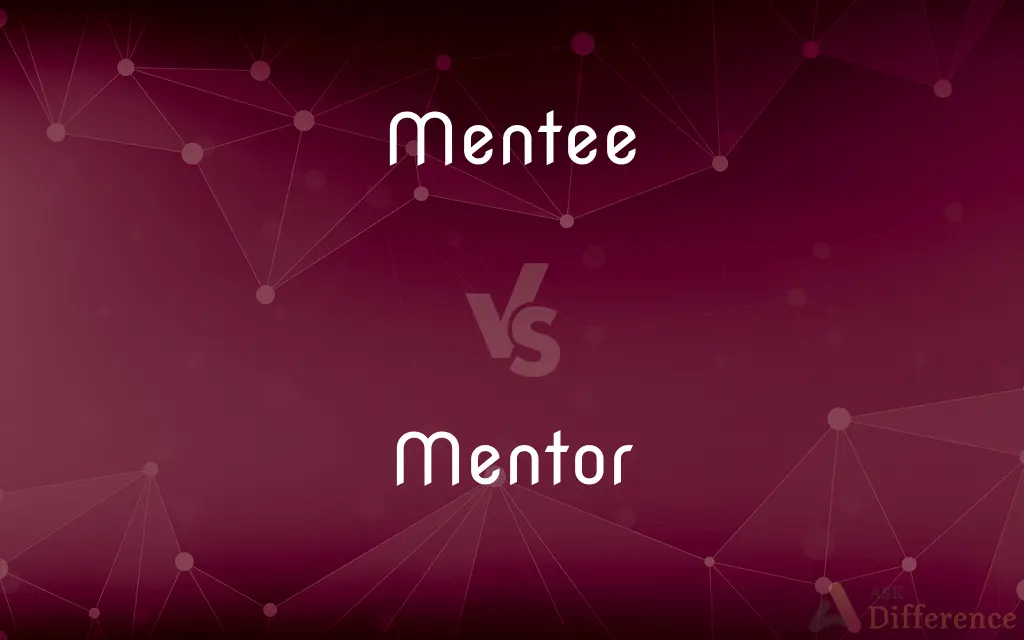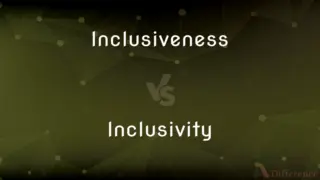Mentee vs. Mentor — What's the Difference?
By Maham Liaqat & Urooj Arif — Updated on March 7, 2024
Mentees seek guidance and learning, while mentors provide expertise and support.

Difference Between Mentee and Mentor
Table of Contents
ADVERTISEMENT
Key Differences
Mentees, individuals seeking guidance, enter mentorship to gain knowledge, skills, and professional development from experienced individuals. They are often at the beginning stages of their career or learning path, looking to grow under the tutelage of someone more experienced. Mentors, on the other hand, are seasoned professionals or individuals with a wealth of experience and knowledge in a particular field or area of life. They offer advice, share their expertise, and support the growth and development of their mentees, drawing from their own experiences and lessons learned.
The relationship between a mentee and a mentor is characterized by its developmental nature, focusing on the growth, learning, and advancement of the mentee. Mentees actively seek feedback, advice, and direction to navigate their personal and professional challenges. Conversely, mentors provide a supportive and nurturing environment, fostering an exchange where mentees can explore ideas, ask questions, and make informed decisions about their future.
Mentees benefit from the relationship by gaining insights, developing new skills, and enhancing their professional networks, which can lead to accelerated career growth and personal development. Mentors, while they primarily serve to guide and support, often find value in the mentorship relationship through the satisfaction of contributing to someone else's growth, gaining fresh perspectives, and enhancing their own leadership and coaching skills.
A successful mentorship relationship requires clear communication, mutual respect, and a commitment to the mentee's development. While mentees must be proactive, open to feedback, and eager to learn, mentors should be approachable, empathetic, and willing to invest time and resources into the mentee's growth. The synergy between a mentee's willingness to learn and a mentor's desire to impart wisdom is the cornerstone of an effective mentorship.
Both mentees and mentors play crucial roles in the learning process, with each contributing to the dynamic and reciprocal nature of mentorship. This relationship not only promotes individual growth and development but also strengthens the broader community by fostering a culture of learning, sharing, and support.
ADVERTISEMENT
Comparison Chart
Role
Seeks guidance and learning
Provides expertise and support
Objective
To gain knowledge and professional development
To guide and facilitate the growth of the mentee
Stage
Often at the beginning of their career or learning path
Experienced professional or individual with deep knowledge
Benefits
Gains insights, skills, and networks
Finds satisfaction in contributing to others' growth and gains fresh perspectives
Requirements
Proactivity, openness to feedback, eagerness to learn
Approachability, empathy, willingness to invest time
Compare with Definitions
Mentee
A person seeking guidance and learning in a specific area.
The mentee approached her mentor for career advice.
Mentor
An experienced individual offering guidance and support.
The mentor shared valuable industry insights with her mentee.
Mentee
Aims to develop professionally under the guidance of a mentor.
As a mentee, he was eager to learn and grow in his field.
Mentor
Helps mentees navigate their professional and personal development.
The mentor provided strategies for work-life balance.
Mentee
Requires a proactive and open mindset.
The successful mentee regularly sought feedback and new challenges.
Mentor
Draws on personal experiences to guide mentees.
Using his own career journey, the mentor illustrated key lessons.
Mentee
Grows through tailored advice and support.
The mentee's skills improved significantly with the mentor's guidance.
Mentor
Enhances leadership skills through mentoring.
Through mentoring, he honed his ability to inspire and lead others.
Mentee
Benefits from the mentor's experience and network.
The mentee expanded her professional network through her mentor.
Mentor
Gains satisfaction from contributing to mentees' growth.
The mentor felt fulfilled seeing her mentee succeed.
Mentee
A person who is advised, trained, or counselled by a mentor.
Mentor
A wise and trusted counselor or teacher.
Mentee
One who is mentored.
Mentor
Mentor Greek Mythology Odysseus's trusted counselor, in whose guise Athena became the guardian and teacher of Telemachus.
Mentee
A person who is being mentored.
Mentor
To serve as a trusted counselor or teacher, especially in occupational settings.
Mentor
To serve as a trusted counselor or teacher to (another person).
Mentor
A wise and trusted counselor or teacher.
Mentor
(transitive) To act as someone's mentor.
Mentor
A wise and faithful counselor or monitor.
Mentor
A wise and trusted guide and advisor
Mentor
Serve as a teacher or trusted counselor;
The famous professor mentored him during his years in graduate school
She is a fine lecturer but she doesn't like mentoring
Common Curiosities
What is a mentee?
A mentee is someone who seeks guidance, knowledge, and skills from a more experienced individual in a mentorship relationship.
How does one benefit from being a mentee?
Being a mentee offers opportunities for personal and professional development, access to a mentor's network, and insights from the mentor's experiences.
What qualities make a good mentor?
A good mentor possesses experience, empathy, effective communication skills, and a genuine interest in the mentee's development.
What is reverse mentoring?
Reverse mentoring involves a younger or less experienced individual acting as a mentor to share new perspectives, skills, or knowledge with an older or more experienced mentee.
What does a mentor do?
A mentor provides expertise, support, and advice to a less experienced individual (mentee), helping them to grow professionally and personally.
Can mentorship impact a mentor's personal growth?
Yes, mentors can experience personal growth, gain fresh perspectives, and enhance their leadership and coaching skills through the mentorship process.
Are there formal and informal mentorship relationships?
Yes, mentorship can be formal, with structured programs and goals, or informal, based on spontaneous, less structured interactions.
How long does a typical mentorship relationship last?
The duration of a mentorship relationship can vary, ranging from a few months to several years, depending on the goals and needs of the mentee and mentor.
How can a mentee make the most out of a mentorship relationship?
A mentee can maximize the mentorship experience by being proactive, open to feedback, setting clear goals, and maintaining effective communication with the mentor.
What challenges might a mentor face?
Mentors may face challenges such as aligning expectations, time management, and effectively conveying their experiences and knowledge to the mentee.
How do cultural differences impact mentorship?
Cultural differences can influence mentorship dynamics, communication styles, and expectations, requiring cultural sensitivity and adaptability from both mentors and mentees.
Can mentorship occur in non-professional contexts?
Yes, mentorship can extend beyond professional settings into personal development, hobbies, and other areas of interest.
What role does feedback play in mentorship?
Feedback is crucial in mentorship, offering mentees valuable insights into their performance and areas for improvement, while also helping mentors to refine their guidance.
How can organizations support mentorship?
Organizations can support mentorship by establishing formal programs, providing resources and training for mentors and mentees, and recognizing the value of mentorship in career development.
Can technology facilitate mentorship?
Technology can facilitate mentorship by enabling virtual meetings, providing platforms for communication, and offering resources for learning and collaboration.
Share Your Discovery

Previous Comparison
Forecast vs. Forecasted
Next Comparison
Inclusiveness vs. InclusivityAuthor Spotlight
Written by
Maham LiaqatCo-written by
Urooj ArifUrooj is a skilled content writer at Ask Difference, known for her exceptional ability to simplify complex topics into engaging and informative content. With a passion for research and a flair for clear, concise writing, she consistently delivers articles that resonate with our diverse audience.














































